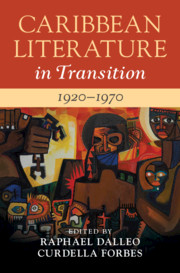Book contents
- Caribbean Literature in Transition, 1920–1970
- Caribbean Literature in Transition
- Caribbean Literature in Transition, 1920–1970
- Copyright page
- Contents
- Figure
- Contributors
- Introduction
- Part I Literary and Generic Transitions
- Part II Cultural and Political Transitions
- Part III The Caribbean Region in Transition
- Part IV Critical Transitions
- Chapter 18 Forging the Critical Canon
- Chapter 19 Forgotten Trailblazers
- Chapter 20 Recuperating Women Writers
- Chapter 21 Rhizomatic Genealogies
- Chapter 22 Writing Indo-Caribbean Masculinity
- Chapter 23 Writing and Reading Sex and Sexuality
- Bibliography
- Index
Chapter 22 - Writing Indo-Caribbean Masculinity
from Part IV - Critical Transitions
Published online by Cambridge University Press: 16 December 2020
- Caribbean Literature in Transition, 1920–1970
- Caribbean Literature in Transition
- Caribbean Literature in Transition, 1920–1970
- Copyright page
- Contents
- Figure
- Contributors
- Introduction
- Part I Literary and Generic Transitions
- Part II Cultural and Political Transitions
- Part III The Caribbean Region in Transition
- Part IV Critical Transitions
- Chapter 18 Forging the Critical Canon
- Chapter 19 Forgotten Trailblazers
- Chapter 20 Recuperating Women Writers
- Chapter 21 Rhizomatic Genealogies
- Chapter 22 Writing Indo-Caribbean Masculinity
- Chapter 23 Writing and Reading Sex and Sexuality
- Bibliography
- Index
Summary
In the mid twentieth century, writers such as V. S. Naipaul, Sam Selvon, Ismith Khan, and Peter Kempadoo produced stories and novels that were often received and understood in terms of the nationalist writing of the period. At the same time, their work represented in important ways Indo-Caribbean experiences that often complicated narratives of the nation and drew attention to tensions mapped onto perceived ethnic differences, such as those examined in Selvon’s lecture ‘Three Into One Can’t Go – East Indian, Trinidadian, West Indian’. Looking at the first published novels of Kempadoo, Naipaul, Selvon, and Khan, this chapter assesses the ways in which these writers represent the spatial, racial, and classed complexities of establishing one’s identity as an Indo-Caribbean man in the post-slavery and post-indentureship spaces of Guyana and Trinidad. Comparing the authors’ various approaches to themes of gender relations, belonging, cross-racial relations, and shifting class identity in both local and global contexts, the chapter lays out the unique and unsettled nature of Indo-Caribbean masculinity in the mid twentieth century. By pulling back the lens to focus on four Indo-Caribbean writers’ explorations of masculinity in their first novels, the chapter also provides a context and counter to the global dominance of V. S. Naipaul’s depictions of this subject position.
Keywords
- Type
- Chapter
- Information
- Caribbean Literature in Transition, 1920–1970 , pp. 355 - 368Publisher: Cambridge University PressPrint publication year: 2021



